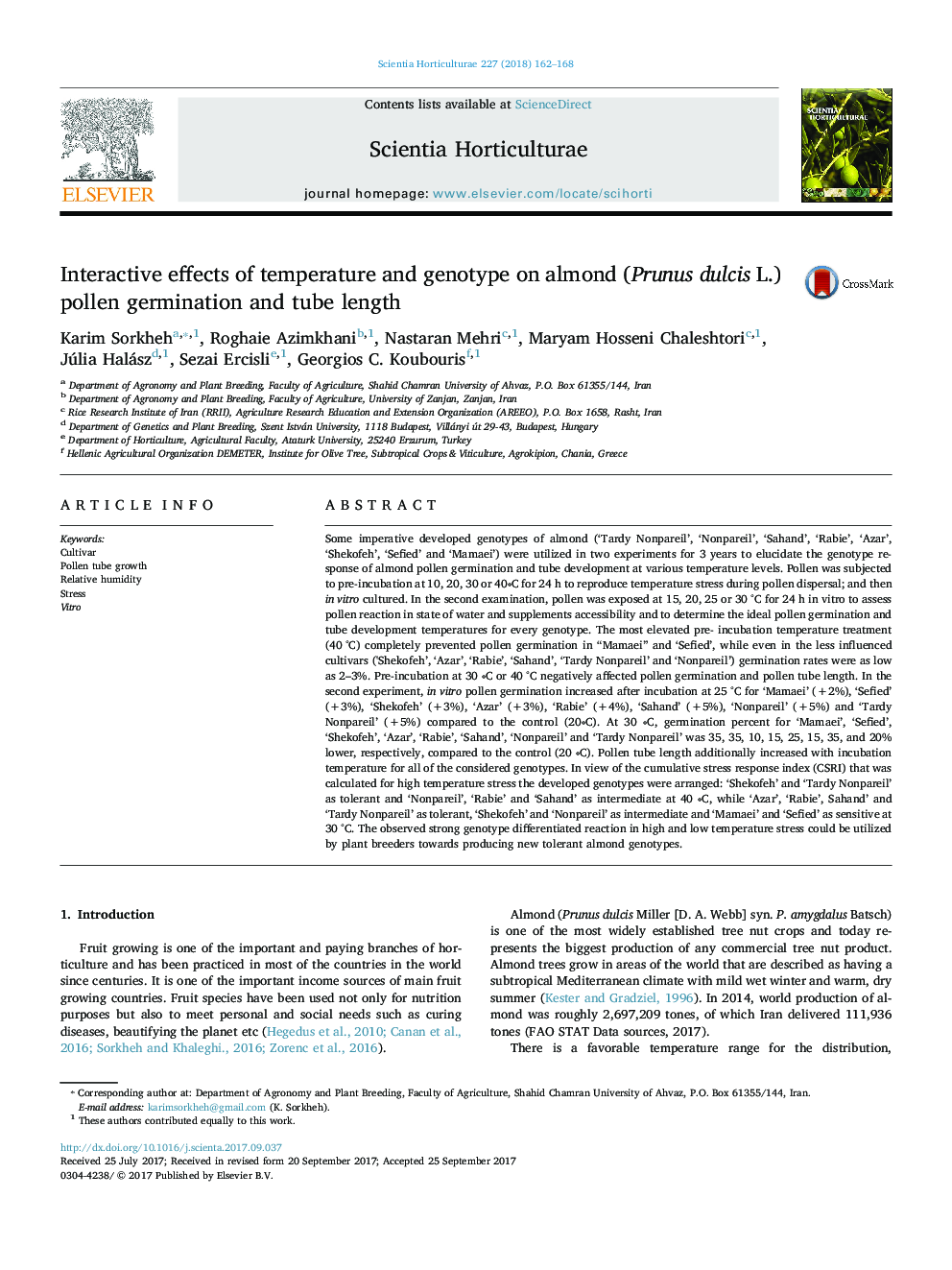| کد مقاله | کد نشریه | سال انتشار | مقاله انگلیسی | نسخه تمام متن |
|---|---|---|---|---|
| 5769467 | 1628771 | 2018 | 7 صفحه PDF | دانلود رایگان |

- Eight important almond cultivars were studied.
- Pollen germination was reduced at heat stress.
- Pollen tube length was reduced at low temperature.
- Choice of cultivars according to climatic conditions.
Some imperative developed genotypes of almond ('Tardy Nonpareil', 'Nonpareil', 'Sahand', 'Rabie', 'Azar', 'Shekofeh', 'Sefied' and 'Mamaei') were utilized in two experiments for 3 years to elucidate the genotype response of almond pollen germination and tube development at various temperature levels. Pollen was subjected to pre-incubation at 10, 20, 30 or 40âC for 24 h to reproduce temperature stress during pollen dispersal; and then in vitro cultured. In the second examination, pollen was exposed at 15, 20, 25 or 30 °C for 24 h in vitro to assess pollen reaction in state of water and supplements accessibility and to determine the ideal pollen germination and tube development temperatures for every genotype. The most elevated pre- incubation temperature treatment (40 °C) completely prevented pollen germination in “Mamaei” and 'Sefied', while even in the less influenced cultivars ('Shekofeh', 'Azar', 'Rabie', 'Sahand', 'Tardy Nonpareil' and 'Nonpareil') germination rates were as low as 2-3%. Pre-incubation at 30 âC or 40 °C negatively affected pollen germination and pollen tube length. In the second experiment, in vitro pollen germination increased after incubation at 25 °C for 'Mamaei' (+2%), 'Sefied' (+3%), 'Shekofeh' (+3%), 'Azar' (+3%), 'Rabie' (+4%), 'Sahand' (+5%), 'Nonpareil' (+5%) and 'Tardy Nonpareil' (+5%) compared to the control (20âC). At 30 âC, germination percent for 'Mamaei', 'Sefied', 'Shekofeh', 'Azar', 'Rabie', 'Sahand', 'Nonpareil' and 'Tardy Nonpareil' was 35, 35, 10, 15, 25, 15, 35, and 20% lower, respectively, compared to the control (20 âC). Pollen tube length additionally increased with incubation temperature for all of the considered genotypes. In view of the cumulative stress response index (CSRI) that was calculated for high temperature stress the developed genotypes were arranged: 'Shekofeh' and 'Tardy Nonpareil' as tolerant and 'Nonpareil', 'Rabie' and 'Sahand' as intermediate at 40 âC, while 'Azar', 'Rabie', Sahand' and 'Tardy Nonpareil' as tolerant, 'Shekofeh' and 'Nonpareil' as intermediate and 'Mamaei' and 'Sefied' as sensitive at 30 °C. The observed strong genotype differentiated reaction in high and low temperature stress could be utilized by plant breeders towards producing new tolerant almond genotypes.
Journal: Scientia Horticulturae - Volume 227, 3 January 2018, Pages 162-168